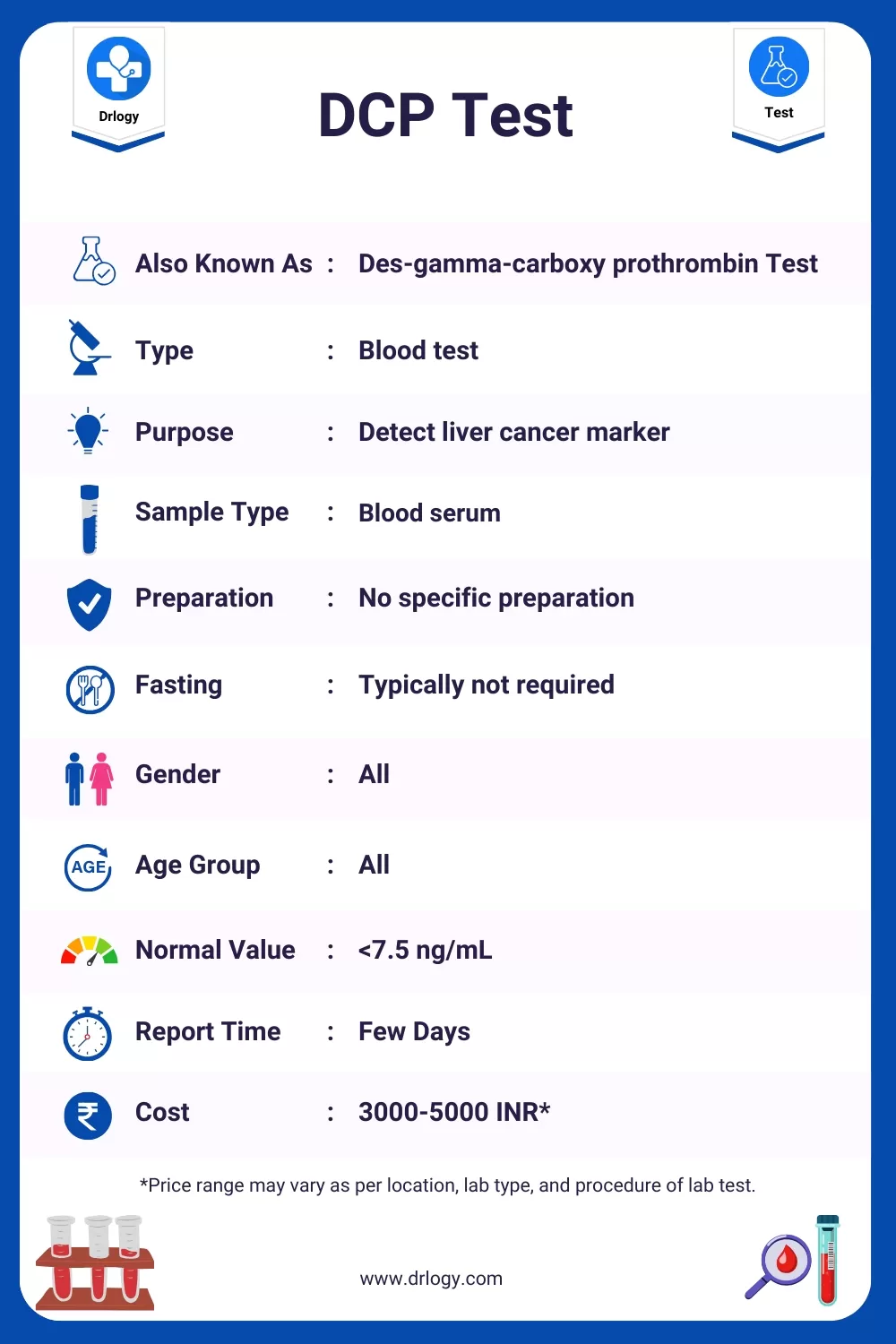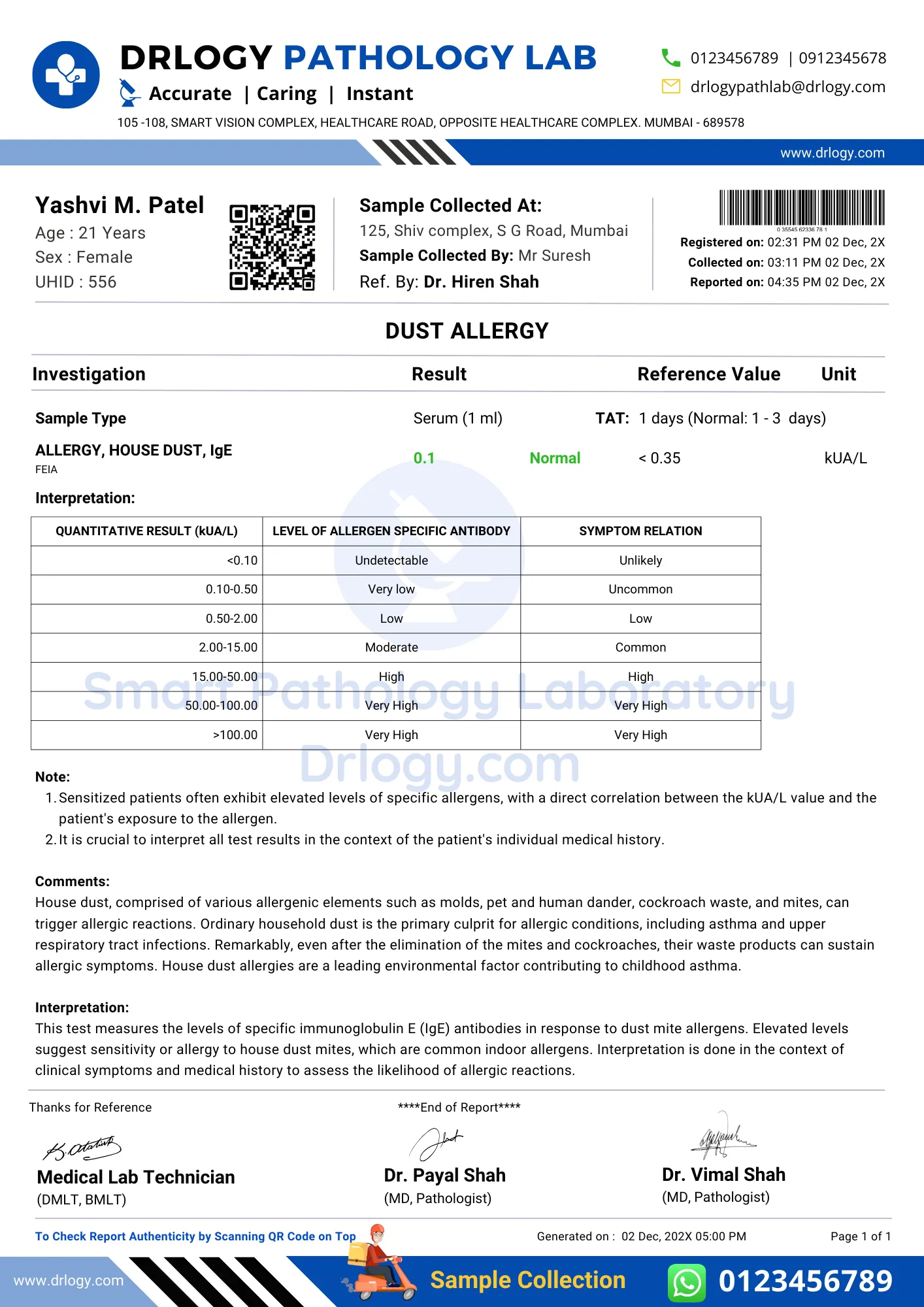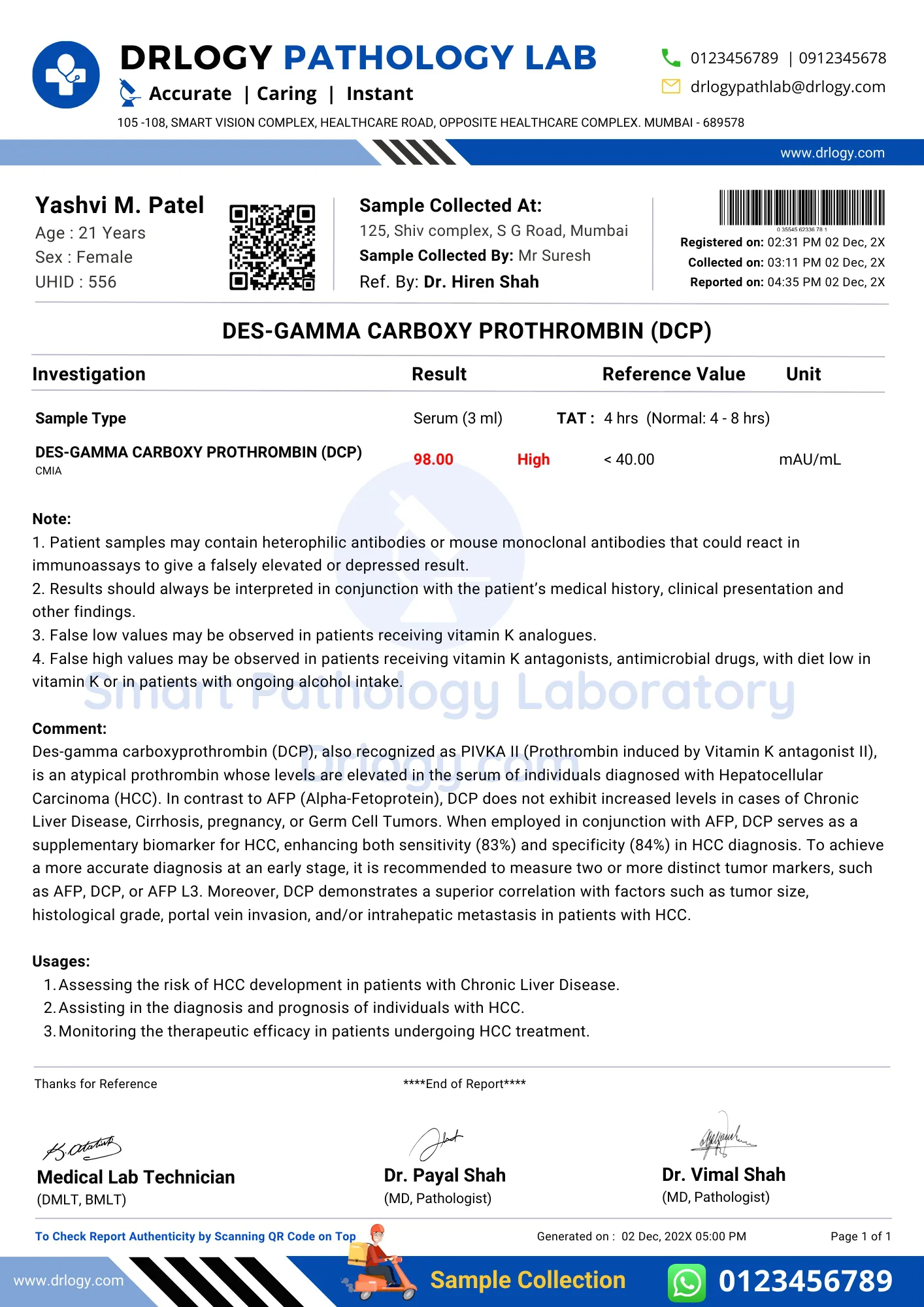
Des-gamma-carboxy prothrombin (DCP) Test For Liver Cancer
The DCP test is a blood test used to detect the presence of a protein called des-gamma-carboxy prothrombin, which can be elevated in liver cancer. It aids in the diagnosis and monitoring of hepatocellular carcinoma (a common form of liver cancer).
DCP Test
Here are the basic details of the DCP Test.
| Also Known As | Des-gamma-carboxy prothrombin Test |
| Type | Blood test |
| Purpose | Detect liver cancer marker |
| Sample Type | Blood serum |
| Preparation | No specific preparation |
| Fasting | Typically not required |
| Gender | All |
| Age Group | All |
| Normal Value | <7.5 ng/mL |
| Reporting Time | Few Days |
| Cost | 3000-5000 INR* |
*DCP Test Price range may vary as per location, lab type, and procedure of lab test.
DCP Test Means
Des-gamma-carboxy prothrombin (DCP) Test Measures the presence of DCP in the blood.
- Important in the diagnosis and monitoring of liver cancer (Hepatocellular carcinoma).
- Helps detect liver cancer at an early, potentially treatable stage.
- Used in conjunction with other liver cancer screening methods.
- Assists in assessing treatment responses and recurrence.
- Valuable for individuals at risk of liver cancer.
DCP Test Purpose
The purpose of the DCP Test is to:
- Diagnose and monitor liver cancer (Hepatocellular carcinoma).
- Detect liver cancer at an early, treatable stage.
- Assist in assessing treatment responses and recurrence.
- Used in combination with other liver cancer screening methods.
- Valuable for individuals at risk of liver cancer.

DCP Test Preparation
Here is the basic preparation for the DCP Test.
Before Test
- Consult with your healthcare provider to discuss the test and its purpose.
- Share your medical history, including any liver conditions, medications, and recent medical procedures.
- Follow any specific pre-test instructions, such as fasting or medication adjustments, provided by your healthcare provider.
- Ensure the clinic or hospital has access to your complete medical records.
- Be prepared for blood sample collection, as this test typically involves a blood draw.
During Test
- Arrive at the clinic or hospital at the appointed time.
- Wear comfortable clothing that allows easy access to your arm for blood collection.
- Remain calm and cooperative during the blood draw or sample collection.
- Notify the medical staff of any discomfort or unusual symptoms experienced during the test.
- The test involves a relatively quick and routine blood collection procedure.
After Test
- Stay at the clinic or hospital for any recommended observation or recovery period, if necessary.
- Resume your regular activities unless otherwise instructed by your healthcare provider.
- Schedule a follow-up appointment with your healthcare provider to discuss the test results.
- Review the implications of the test results for any liver condition diagnosis or monitoring.
- Collaborate with your healthcare team to make informed decisions regarding treatment or further testing based on the DCP test outcome.
DCP Test Procedure
Here is the basic DCP Test Procedure.
- Blood sample is collected.
- The sample is processed to measure DCP levels.
- Immunoassays or other methods are used for DCP detection.
- Results are used for diagnosing and monitoring liver cancer.
- Typically performed alongside other liver cancer screening methods.
DCP Test Result
Here is the basic reading of the Des-gamma-carboxy prothrombin (DCP) Test results.
- DCP Levels: Check the levels of Des-gamma-carboxy prothrombin (DCP). Elevated DCP levels may indicate liver abnormalities, particularly hepatocellular carcinoma.
- Reference Range: Compare the DCP levels in the report to the reference range provided. Values outside the reference range may be of concern.
- Diagnosis: Look for any mention of a liver cancer diagnosis or the need for further evaluation.
- Recommendations: Note any recommendations for additional tests, monitoring, or treatment based on the DCP test results.
DCP Test Normal Result Report

DCP Test Normal Report
DCP Test Abnormal Result Report

DCP Test Abnormal Report
DCP Test Normal Range
Here is the normal range of the DCP Test
| Test Name | Reference Range |
|---|---|
| Des-gamma-carboxy prothrombin (DCP) | <7.5 ng/mL |
DCP Test Interpretation
Here is the Interpretation of the DCP Test.
| DCP Level (ng/mL) | Interpretation |
|---|---|
| <7.5 | Within the normal reference range. |
| 7.5 - 10.0 | Borderline or slightly elevated DCP levels. |
| >10.0 | Elevated DCP levels, indicating possible issues. |
DCP Test High Levels
Here are potential causes of high Des-gamma-carboxy prothrombin (DCP) test levels:
| Potential Cause | Explanation |
|---|---|
| Liver Cancer | Elevated DCP levels are often associated with hepatocellular carcinoma (liver cancer). |
| Cirrhosis | Advanced liver cirrhosis can lead to increased DCP levels due to liver damage. |
| Liver Dysfunction | Any condition that impairs liver function may result in elevated DCP levels. |
| Chronic Hepatitis | Certain types of chronic viral hepatitis (e.g., hepatitis B or C) can lead to elevated DCP levels. |
| Alcohol Abuse | Prolonged alcohol abuse can cause liver damage, potentially leading to high DCP levels. |
| Other Liver Diseases | Some non-cancerous liver conditions can also result in elevated DCP levels. |
| Medications | Certain medications or drugs may affect liver function and DCP levels. |
High DCP levels are typically a concerning finding and may warrant further evaluation and diagnostic tests to determine the underlying cause.
DCP Test Low Levels
Here are potential causes of low Des-gamma-carboxy prothrombin (DCP) test levels:
| Potential Cause | Explanation |
|---|---|
| Vitamin K Deficiency | Insufficient vitamin K in the body can result in reduced DCP levels as it is necessary for the carboxylation of prothrombin. |
| Malabsorption Disorders | Conditions that impair the absorption of vitamin K, such as celiac disease or Crohn's disease, can lead to low DCP levels. |
| Warfarin or Blood Thinners | Medications like warfarin (Coumadin) interfere with the coagulation process and can cause decreased DCP levels. |
| Liver Disease | Severe liver dysfunction, particularly in advanced cirrhosis, may lead to reduced synthesis of DCP. |
| Underlying Coagulopathy | Conditions affecting blood coagulation may indirectly impact DCP levels. |
| Rare Genetic Disorders | Certain rare genetic disorders can affect the production or functioning of prothrombin. |
| Hemorrhagic Disorders | Some bleeding disorders can result in low DCP levels due to excessive bleeding. |
Low DCP levels should be interpreted in the context of the patient's overall health and medical history, and further investigation may be necessary toentify the underlying cause.
Specimen Requirements For DCP Test
Here are the specimen requirements for the DCP Test.
| Specimen | Serum Frozen | |
| Volume | 0.5 ml | |
| Container | Red-top tube or gel-barrier tube | |
| Collection | Separate serum from cells and transfer to a plastic transport tube. | |
| Storage | Freeze. | |
| Causes for Rejection | Gross icterus; gross hemolysis. | |
DCP Test is Safe?
The DCP test is safe and involves a routine blood sample collection.
- There are no specific risks or side effects associated with the test itself.
- Patient safety is a priority, and medical professionals ensure proper blood collection and processing.
When Do You Get DCP Test Results?
- DCP test results are typically available within a few days after the blood sample is collected.
- Patients can discuss the results and their implications during a follow-up appointment with their healthcare provider.
DCP Test Limitation
Here is the basic limitation of DCP Test.
- Elevated DCP levels are not exclusive to liver cancer.
- False positives can occur, leading to unnecessary concern.
- Limited as a standalone diagnostic tool.
- Cannot differentiate between liver cancer stages.
- May require confirmation with additional tests or imaging.
DCP Test Risk Factors
Here are some of the risk factors of the DCP Test.
- Minimal risk associated with a routine blood draw.
- Possible false positives or false negatives.
- DCP elevation is not specific to liver cancer.
- Limitations in differentiating between liver diseases.
- Risk of misinterpretation without considering clinical context.
Doctor Recommendations After DCP Test Result
Here are the Doctor's recommendations or consult a specialist after the DCP Test.
| DCP Test Result | Doctor to Consult | Reason to Go to Doctor |
|---|---|---|
| High | Hepatologist | Evaluate liver health. |
| Normal | Primary Care | Routine health assessment. |
| Low | Hematologist | Investigate bleeding disorders. |
DCP Test Price
Here are the estimated DCP Test Prices in India with different top cities:
| City | Price Range (INR)* |
| 3000-5000 | |
| 3200-5000 | |
| 3000-5000 | |
| 3200-5000 | |
| 3000-5000 | |
| 3200-5000 | |
| 3000-5000 | |
| 3200-5000 | |
| 3200-5000 | |
| 3000-5000 | |
| 3200-5000 | |
| 3000-5000 | |
| 3200-5000 | |
| 3000-5000 |
*DCP Test Prices are approximate and vary depending on a specific laboratory or healthcare facility.
Summary
Overall, DCP Test play a crucial in the early detection and monitoring of liver cancer, facilitating timely interventions and improved patient outcomes. Also check Drlogy Test for detailed information about all medical tests for patients, doctors, scholers and medical students.
Reference
- Des-gamma carboxyprothrombin - Wikipedia [1].
- A Systematic Review of Des-γ-Carboxy Prothrombin for the Diagnosis of Primary Hepatocellular Carcinoma - NIH [2].




